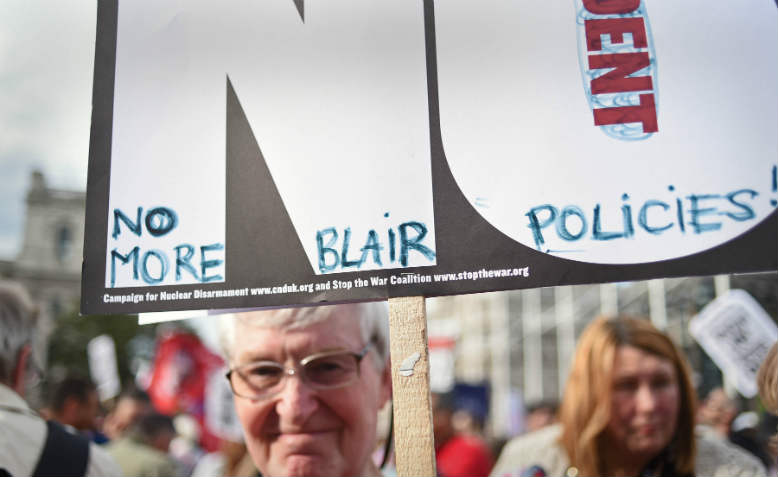 Defend Corbyn Rally, Parliament Square, London, June 2016. Photo: Jim Aindow
Defend Corbyn Rally, Parliament Square, London, June 2016. Photo: Jim Aindow
Retreating over foreign policy will allow the right to regroup, argues John Rees
The second leadership win for Jeremy Corbyn should be the end of the Labour right’s attempts to unseat him. The members of the largest labour party in Europe have spoken, and spoken decisively. If there was ever a moment when the Labour left could, with total legitimacy, fundamentally recreate Labour as a genuinely socialist and internationalist party then this is it.
At the heart of this remodelling of Labour should be foreign policy. A decade and a half of disastrous misadventure has created the longest ever period when electors in this country have rejected the political establishment’s foreign policy. Year on year majorities have rejected the scandalous occupations of Afghanistan and Iraq. Tony Blair became the most hated politician this country has produced (bar Margaret Thatcher) and lost Labour 4 million votes as a result. More recently, a majority opposed the chaos-creating air war in Libya. In many polls a majority also reject the post-imperial delusion of renewing the humanity threatening Trident nuclear missile system.
Indeed the mess of British foreign policy is now so acute that even the establishment have admitted its failure, as I’ve detailed elsewhere. The Chilcot Report pilloried those responsible for Iraq. A recent Commons Report did the same to those responsible for Libya. This week another Commons Report castigated the current Syria policy (jointly the responsibility of David Cameron and the Labour right led by Hilary Benn) as a fraud.
No conceivable Labour leader but Jeremy Corbyn could be better placed to exploit this historic moment of establishment weakness. As a founder of the Stop the War Coalition he has the best record of any MP in opposing the disasters of Afghanistan, Iraq, Libya and Syria. As vice-chair of CND his long commitment to unilateral nuclear disarmament is a matter of public record. Corbyn’s record as an advocate of the Palestinian cause is no less impressive or long-standing.
But there are now too many worrying signs that this necessary internationalism will be sacrificed on the altar of ‘party unity’.
In fact there have already been too many compromises. The whole farrago of making Hilary Benn Foreign Secretary was born of precisely this urge to placate the Labour right over foreign policy. The decision by John McDonnell to overrule Jeremy Corbyn in demanding a free vote on Syria added to this foolishness (although when it comes to the vote over the expansion of Heathrow, which lies in his constituency, John McDonnell is opposed to a free vote).
The results we all know. The number of Labour MPs voting with Cameron over Syria was larger than it would have been. Hilary Benn, and the whole Labour right, were emboldened by Benn’s media-lauded summation speech in the Syria debate. Thus many Labour MPs are now culpable for the mess of the Syria intervention highlighted in last week’s Commons report. And Hilary Benn’s gratitude was shown by resigning and organising the coup against Jeremy. John McDonnell’s reaction after Jeremy’s second victory was to give a media interview saying that he would welcome Hilary Benn back to the shadow cabinet.
Clive Lewis, touted by Owen Jones as a replacement for Jeremy Corbyn, made a monumental hash of the Trident debate by abstaining on, rather than opposing, its renewal. He has also come out as a defender of NATO.
Any more retreats like this will mark a breach not only with the anti-war and anti-nuclear movement but, much more importantly, with the millions of UK voters who know that foreign policy is broken and should be replaced by a genuinely internationalist stance.
The Labour Party, including the Labour left, have always found this a difficult stance to take. They are wedded to the idea that social change comes through capturing the existing state through elections. Dangers to that state are treated as dangers to the very institution to which Labour looks to effect change.
This is why Labour has repeatedly backed imperial wars. This is why it so often retreats on precisely those issues which mean so much to the British ruling class issues that that call into question the integrity of the British state. Any issue which touches on the stability of the state is an issue on which Labour remains glued to the establishment: Scottish Independence, EU membership, war, and nuclear weapons.
But if Jeremy Corbyn retreats on these issues it will be a mortal threat to his project. Other retreats, domestic as well as international, will follow. Supporters will be demoralised. Enemies will be emboldened. And the next coup, or the one after that, will be successful. Rot from within will weaken Corbynism and allow its enemies to overpower it.
It doesn’t look like that now of course, as we bask in the light of a second leadership election victory. But how many times in military history has a ruthless enemy army escaped to fight again because the victors did not know how to exploit their victory?

